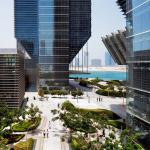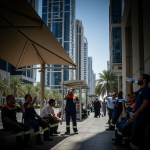As part of its ongoing mission to become a global benchmark for utility innovation, the Dubai Electricity and Water Authority (DEWA) is ramping up the integration of artificial intelligence (AI) technologies across its energy distribution operations. This initiative aligns with DEWA’s broader digital transformation strategy and is aimed at enhancing the efficiency, reliability, and intelligence of Dubai’s power infrastructure.
At the heart of this transformation is DEWA’s advanced smart grid system, a core component of its future-forward infrastructure development. The authority has allocated over AED 7 billion towards this initiative, with investments projected through to 2035. The smart grid not only enables seamless energy delivery but also supports 24/7 automated operations and real-time monitoring, thereby ensuring that residents and businesses receive uninterrupted and high-quality service.
His Excellency Saeed Mohammed Al Tayer, Managing Director and CEO of DEWA, highlighted the strategic value of this digital evolution. “Our commitment to adopting disruptive technologies from the Fourth Industrial Revolution, particularly AI and machine learning, has significantly enhanced the operational readiness of our grid. It has also contributed to unprecedented levels of reliability in service delivery,” said Al Tayer.
Smart Centre Drives Data-Led Decision Making
One of the key pillars of DEWA’s AI strategy is its Distribution Network Smart Centre, a facility designed to manage and analyze vast volumes of operational data. The centre processes over 15 million units of data daily from the energy distribution network. Through sophisticated analytics and AI models, this data is converted into actionable insights presented through interactive dashboards. These insights are crucial for real-time decision-making, predictive maintenance, and efficient fault response.
The smart centre also employs big data technologies and machine learning algorithms to diagnose potential issues in the network before they escalate. This proactive approach enables DEWA to conduct preventive maintenance and reduce service interruptions, thereby improving customer satisfaction and reducing operational costs.
Global Leadership in Reliability
Dubai’s commitment to leveraging AI in public utilities is already paying off. In 2024, the emirate recorded an average of just 0.94 minutes of electricity interruption per customer per year, one of the lowest figures globally. This is in stark contrast to the 15-minute average experienced in many advanced European cities. This milestone reflects not only the technical sophistication of DEWA’s infrastructure but also its forward-thinking leadership in utility management.
Expansion of Smart Metering Infrastructure
To support the growing demand for electricity driven by Dubai’s rapid economic and urban development, DEWA has made significant progress in deploying smart metering technologies. By the end of 2024, the authority had installed 1,202,411 smart electricity meters and 1,103,901 smart water meters across the emirate. These meters play a crucial role in enabling customers to monitor consumption, reduce waste, and contribute to sustainability goals.
Additionally, DEWA’s network now includes 69 substations operating at 33kV and over 45,317 medium-voltage substations (11kV and 6.6kV). These facilities are integral to ensuring consistent power distribution throughout Dubai’s residential, commercial, and industrial sectors.
Towards a Smarter, Greener Future
As the UAE continues to invest in digital innovation and sustainability, DEWA’s leadership in applying AI to energy distribution underscores the nation’s ambition to become a global hub for smart infrastructure. By leveraging emerging technologies, DEWA not only enhances its service capabilities but also contributes to the UAE’s Net Zero by 2050 strategic initiative.
“Deploying AI in the energy sector is not just about efficiency—it’s about building a smarter, more sustainable future for generations to come,” added Al Tayer.
With these developments, DEWA is reinforcing Dubai’s position as one of the most technologically advanced cities in the world, setting new standards in energy management, digital transformation, and customer-centric innovation.










